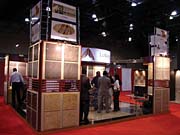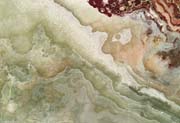

Kankariya had previously worked in the chemical and gemstone fields, and he began working with Madhav Marble & Granite of India. During the first four years, Lotus dealt only in tiles, and then it diversified into slabs in 1995. The company is headquartered in Englewood, NJ, and the group recently launched its U.S. operations under the banner of “Lotus Natural Stone.†Today, Lotus Natural Stone owns Lotus Exim, Inc. in New Jersey and Illinois; Best Marble & Granite, Inc. in Arizona; Perfect Marble & Granite, Inc. in Michigan; and Elegant Marble & Granite, Inc. in Florida.
Lotus' first warehouse was located in Kearny, NJ, and it moved to other locations around New Jersey as business grew. Each business unit is equipped with delivery trucks and other material handling equipment, and the locations are staffed with customer service specialists. Stocking more than 200 colors, the company guarantees consumer satisfaction every time.
“Our business is still based on the model of quality first,†said Kankariya. “There are many factories in India, but all do not focus on quality. Marketing and color trends can also be ignored.â€
To make sure its customers' needs are being met, Lotus keeps a close watch on market trends, and it is continually bringing in new stone offerings. Included are granite, marble, onyx, slate, sandstone and travertine in tiles and slabs as well as monuments made of granite and marble. Meeting a very current design trend, Lotus is also offering granite and other stone materials for backyard gardens and landscaping.
Lotus' line of stone products comes from India and beyond, and 40% of sales come from nations such as Brazil and Spain. Sales are 90% slabs and 10% tiles, and the company also supplies some smaller projects that are cut overseas or by local fabricators.
Kankariya said that granite varieties out of Brazil have been particularly well received by the company's clients over the past few years. “There are approximately three times as many colors of Brazilian granite than can be found in India,†he said. “Production capacities in Brazil are also higher than those in India.â€
Speaking on the Indian market, Kankariya said that it is necessary for a supplier to understand the production obstacles, because government restrictions in India can make it challenging. “They are sometimes starved for raw materials. Selling is not a problem, but getting quality and delivering what you promise can be,†Kankariya said. “The government does not always offer a long-term lease on the quarries. Also, the ports are congested and rates are inconsistent. Still, there are quality factories that know what the U.S. market needs.†Overall, he said the top Indian companies and top Brazilian companies are comparable to one another.
As part of the company's quality-first philosophy, Lotus has prepared its own inspection teams in India, Brazil and Spain. All stone goes through a rigid quality control program at its point of origin, and everything has to have a final stamp of approval from a company representative before it is exported to the U.S.
Lotus' philosophy has been met with success over the past 13 years, as the company has enjoyed growth of 35% per year, and nearly 90% of the firm's business comes from repeat buyers. Overall, the company has 48 employees nationwide, and in the near future, Lotus is planning to open locations in Tucson, AZ, Toledo, OH, and Jacksonville, FL.